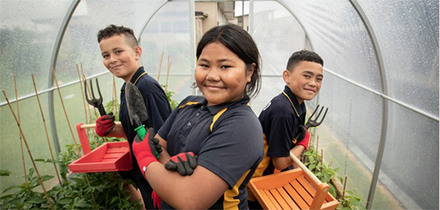Community projects in Auckland are experimenting with adding carbon to their soils, thanks to an initiative supported by Soil Pro and the Mazda Foundation. Source: Timberbiz
Made by upcycling surplus forestry slash, the project was initiated by The Good Carbon Farm to produce carbonised organic matter – or biochar, as it is more commonly known. The biochar is being donated to Oke, who fund and build school gardens; and Restoring Takarunga Hauraki, a community-led organisation involved with multiple environmental restoration projects.
“This project is repurposing underutilised biomass on our doorstep into something good,” The Good Carbon Farm co-founder, Joany Grima said. “When properly added to the ground, biochar becomes a long-term haven for beneficial microbes and nutrients, which plants love.”
Plants are rich in carbon, so when they die and decompose, carbon is re-released into the atmosphere as carbon dioxide and methane. Converting plant waste into biochar is a circular system, capturing up to half the carbon that would otherwise have been emitted, while also creating a plant enhancing product.
Oke will distribute the biochar to some of its Auckland-based school gardens.
“Ever since launching the Oke Charity back in 2016, we have tried to both build school gardens and make them as sustainable as possible,” Oke founder, Paul Dickson said.
“This has been achieved through ongoing relationships with the schools, working with amazing suppliers who come up with innovative products and collaborating with epic partners such as The Good Carbon Farm. Teaching the benefits of biochar gets our Mighty Kids thinking about the wider environmental impact of their school garden and helping them realise they’re learning in an outdoor classroom.”
As well as enjoying international recognition as one of few negative emissions technologies readily available to reverse climate change, biochar increases yield from plants, improves soil and water quality, and reduces fertiliser and irrigation dependency.
Restoring Takarunga Hauraki began experimenting with biochar in its nurseries this year, in an effort to reduce fertiliser use and decrease watering.
“Our native plant nursery has been operating for a few years now and found a permanent home about a year ago in Devonport,” Restoring Takarunga Hauraki Chair, Anne McMillan, said.
“We grow plants for the urban ngahere that are robust and locally eco-sourced. We were concerned about the emissions that fertiliser creates as well as their effect on fungi in the soil so this collaboration with The Good Carbon Farm was an awesome solution for us.
“We are part of an Iwi and community nursery group always looking for innovation to grow better plants. We also want to look at using biochar to filter water that goes into our local streams as this is mostly runoff from roads and contains contaminants that can harm our native fish and invertebrates that live in streams.
“Our mahi builds community through volunteers that manage native plantings, pest weed and pest animal control, stream and repo/wetland restoration and education. We are super excited by the potential of biochar.”
Tomorrow representatives from The Good Carbon Farm and the Mazda Foundation will attend the Oke working bee at Nukumea Primary School where a new school garden is being constructed.
On 9 April, Restoring Takarunga Hauraki will host The Good Carbon Farm and members of the Iwi and community nursery group at the Ngauteringaringa Community Nursery.






